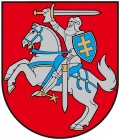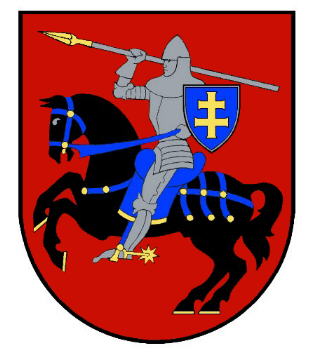Vilnius (district): Difference between revisions
Knorrepoes (talk | contribs) m (Text replacement - "====Official blazon====" to "===Official blazon===") |
Knorrepoes (talk | contribs) m (Text replacement - "====Origin/meaning====" to "===Origin/meaning===") |
||
| Line 9: | Line 9: | ||
===Official blazon=== | ===Official blazon=== | ||
===Origin/meaning=== | |||
The arms were granted on December 20, 1999. | The arms were granted on December 20, 1999. | ||
Revision as of 06:04, 23 June 2017
Lithuania heraldry portal
This page is part of the Lithuania heraldry portal |
Heraldry of the World |
|
Civic heraldry:
|
Other heraldry: |
VILNIUS (District)
County : Vilnius
Official blazon
Origin/meaning
The arms were granted on December 20, 1999.
The arms comes from the late 14th - early 15th century variations of the National Arms of Lithuania. In some cases the knight held a lance, not a sword (e.g. the arms on the King Jogaila's grave).
Though the Vilnius city bears its own arms (St. Christopher), the Vilnius region always used the National Arms: the Vilnius prinicipality, later the Vilnius palatinate, and even the Vilnius (Vilna) governorate of Russian Empire. The Vilnius region is a kernel of Lithuania, and the usage of National Arms was very natural. But the modern law of Republic reserves the official usage of National Arms to state institutions only. So the new arms were created: fulfilling the law and keeping the tradition.
It is not clear, why the white horse of National Arms was changed to the black one. Most possible reason is that a white horse is a symbolic creature, and only a ruler of state could ride it in the past. So this symbol of sovereignity was not allowed on the municipal level.
Contact and Support
Partners:
Your logo here ?
Contact us
© since 1995, Heraldry of the World, Ralf Hartemink 
Index of the site
Literature : Information and image provided by Virginijus Misiunas, Vilnius.












